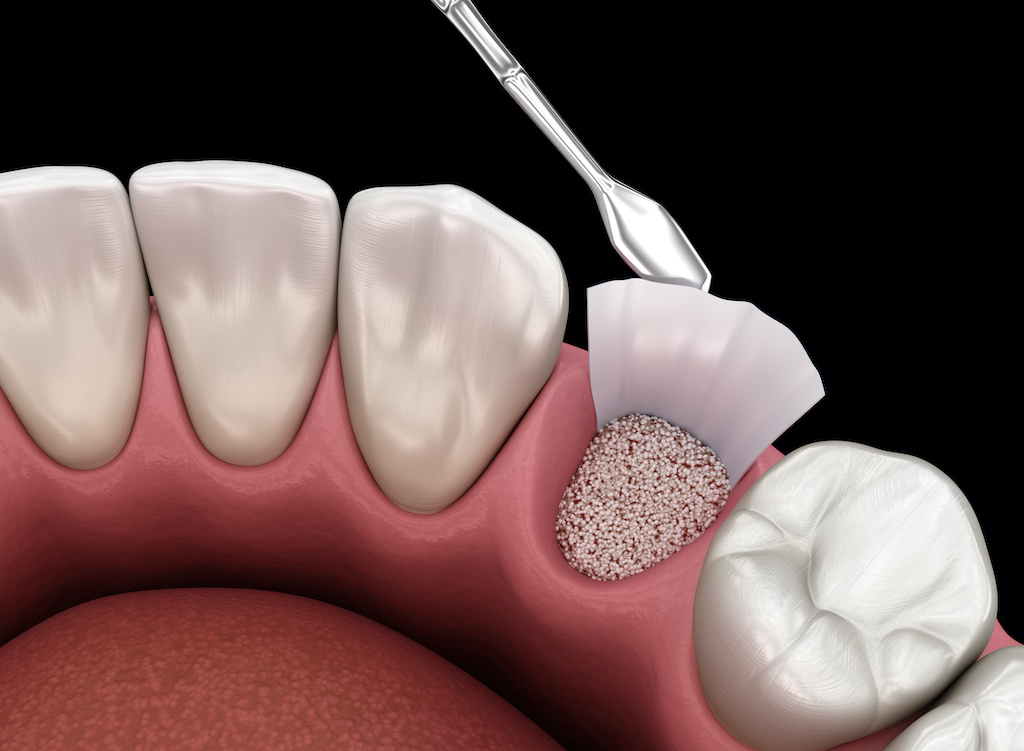Dental Bone Graft
A Dental Bone Graft is neccessary when boneloss has occured in the jaws. The procedure is commonly performed prior to dental implant placement or when boneloss are negatively affecting neighbouring tooth.
What is dental bone graft?
A dental bone graft adds volume and density to your jaw in areas where boneloss has occured.
Types:
 Autogenous - taken from your own body, highly predictable
Autogenous - taken from your own body, highly predictable
 Allograft - Purchased from human tissue bank (donated)
Allograft - Purchased from human tissue bank (donated)
 Zenograft - taken from animals, cost effective, cheaper
Zenograft - taken from animals, cost effective, cheaper
 Alloplast - synthetic
Alloplast - synthetic
How it works?
 Acts like a scaffold on which your own bonetissue can grow and regenerate.
Acts like a scaffold on which your own bonetissue can grow and regenerate.
 Sometimes mixed with PRP-Platelet Rich Plasma to promote healing and tissue regenerate.
Sometimes mixed with PRP-Platelet Rich Plasma to promote healing and tissue regenerate.
Who needs dental bone grafts?
A person with boneloss in the jaws usually needs bonegrafts.
 Extracted tooth - socket preservation
Extracted tooth - socket preservation
 Plan to replace missing tooth with dental implant
Plan to replace missing tooth with dental implant
 Ridge augmentation
Ridge augmentation
 Areas of bone loss due to periodontal diseases
Areas of bone loss due to periodontal diseases
 Sinus lift
Sinus lift
In most cases bonegraft and dental implants must heal completely before the actual implant is placed. Because, each person is unique recovery time varies. Sometimes bone graft and dental implant are placed at the same time and sometimes decided on case by case basis.
How Painful is a dental bone graft?
Most people feel little to no pain. Just follow the post operative instructions and medications carefully.
Can Dental bonegraft fail?
 High successful rates
High successful rates
 Failure is possiblity - Those who smoke or have certain medical conditions
Failure is possiblity - Those who smoke or have certain medical conditions
Signs of failure include:
 Pain or swelling that worsens after the first week
Pain or swelling that worsens after the first week
 Pus or drainage from the bonegraft site
Pus or drainage from the bonegraft site
 Gum recession (When the gums pull away from the teeth)
Gum recession (When the gums pull away from the teeth)
 No Improvement in jawbone volume.
No Improvement in jawbone volume.
Risk and Complications
Generally some risk may happen include:
 Infection
Infection
 Heavy bleeding
Heavy bleeding
 Nerve damage
Nerve damage
 Complications from anesthesia
Complications from anesthesia
Recovery
Usually back to normal with in a week or too. complete healing can take between 3 and 9 months sometimes long here. depends upon several factors including type of graft, the area in which the graft was placed and your bodies healing capacity.
When to call the doctor?
Call your dentist if you experience:
 Severe pain
Severe pain
 Increased swelling
Increased swelling
 Pus around the grafting site
Pus around the grafting site
 Fever of 1.1 degree or higher
Fever of 1.1 degree or higher














